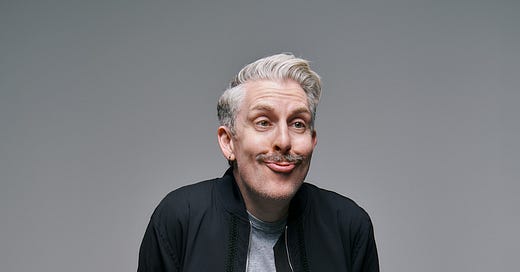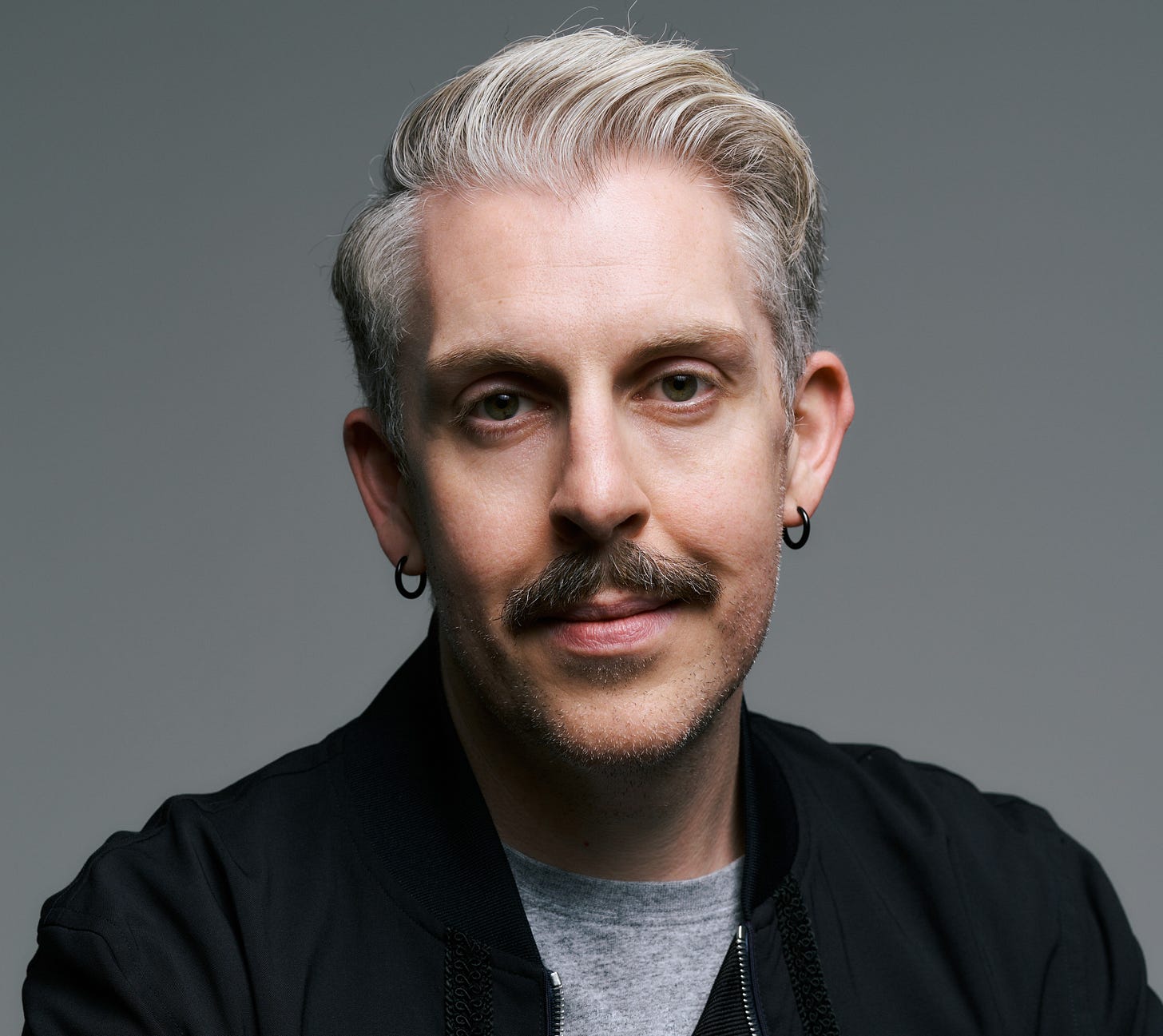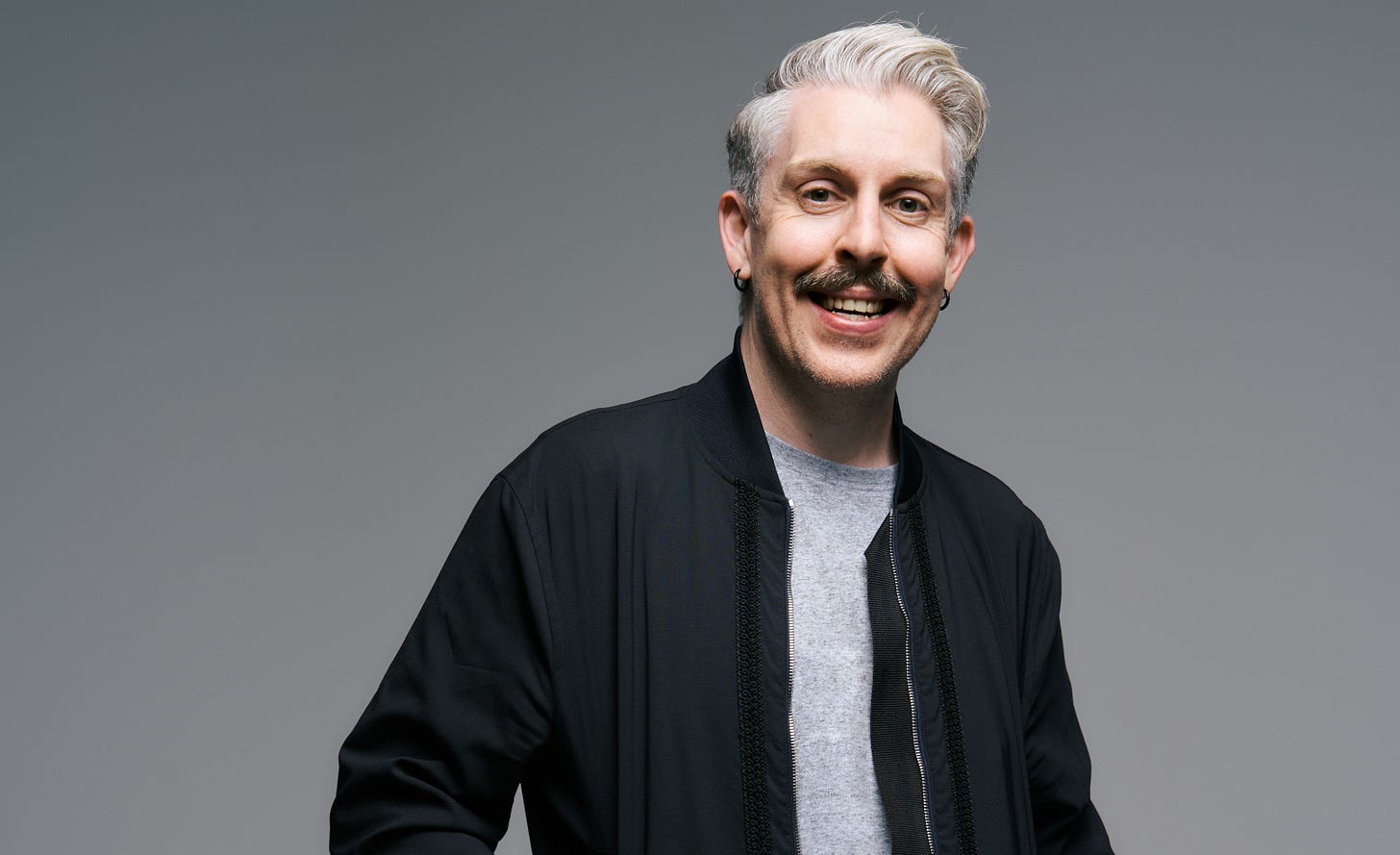How Carl Donnelly Built His Comedy Career
Carl Donnelly is a multi-award-winning stand-up comedian from South London. We chatted about his career journey and thoughts on performing.
Carl Donnelly is a multi-award-winning stand-up comedian from South London. He’s made numerous television appearances, including Mock the Week and Russell Howard’s Good News, and was voted Chortle’s Best Club Comedian in 2017. Carl has an instantly likeable quality. Hearing his gentle voice as he leaned toward the microphone, I joked “You’d be great at ASMR.” He laughed and the interview began.
*audio below the article
Does your comedy attract a certain kind of person?
To be honest… I haven’t noticed a specific demographic in all the years I’ve been going. When people come specifically to see me at the Edinburgh Fringe, Melbourne Comedy Festival and solo tours, that’s when I should notice, but I haven’t.
As you age you start appealing to different types of people, but I notice that more just doing normal gigs. So, if I do a big club gig, like The Comedy Store, I do fine, I have a really good gig, but certain people you can tell are so into it. Those sorts of people tend to be your demographic.
“Nowadays, when I’m doing material about being in my forties, I see middle-aged people really losing it.”
Audiences naturally relate to the comics they see themselves in. Some comedians do have what you’d call a proper “demographic.” I’ve seen shows in Edinburgh where they had a really young, hip audience. I’ve never had anything like that.
Do you think it’s nice to be more open?
I’m glad I don’t represent just one type of person. On the flip side, the comics who do really well either need to be so mainstream that they get everyone, like arena comedians, or become so popular with one specific group that they all come out to you. They’re the two ends of the spectrum where you make the most money. Ha-ha.
I’ve seen Stewart Lee a few times and think he’s captured a demographic. *He’s even joked about it.
Yes, but it’s not just people of a certain age, for example. It’s more of a taste thing – it’s a certain type of comedy fan that loves Stewart’s stuff. And comedians he’s not slagged off, ha-ha. I think he’s amazing, but when I’ve gone to watch him, you can tell 99% of his audience are on the same page.
I can’t imagine people who’ve gone to see him, have gone to… Even Ricky Gervais the next night, for example. I think the two audiences would be very different. If you went to see Stewart, he’s probably having a go at Ricky on stage. Ha-ha.
He did last time!
Oh, did he? I always find it really funny when he does that. I know some comedians don’t like it.
It’s always a bit tongue-in-cheek.
Mmm, and even if it isn’t I find it funny. If you were the butt of it maybe you’d feel differently, but if you’re a comedian you have to be able to take a joke.
“It’s a real insight into your sense of humour if you can’t take somebody mocking you. Some comedians take heckles really personally.”
It's quite rare nowadays, but if you get heckled some comedians take it as such an affront, like “You’ve interrupted my art.” I think: “Come on man, you’re a stand-up comedian.” You’ve got to deal with it in a fun manner. That’s always been my vibe.
How do you do that?
They’re much rarer than people think. The internet makes it look like doing comedy is all crowd work, and you see videos titled “Comedian Destroys Heckler.” It might lead some to believe we’re just standing there taking bullets from our audience every night, but I genuinely can’t remember the last time I saw someone full-on heckling a comedian.
Most of it nowadays comes off the back of a comic trying to get a crowd-work clip. They’ve got a camera set up at the back of the room, and halfway through their set they’re like “So what’s your name?” They’ll start talking and someone else will pitch in; because the comedian has started an “open forum.” I think a true heckle is when somebody shouts out of the blue, completely unprompted.
When I started, it was the mid-two-thousands, but I caught the end of the nineties, in the sense that, the comedy landscape was full of 90’s comedians. There was nothing much on television; it was all clubs, and there weren’t loads of people touring, no panel shows, nothing. So, I saw a kind of 90’s club circuit, and that could be brutal man. You did see a lot of heckles.
“It was that laddy New Labour culture. Sort of ‘Wahey! Britpop’, you know what I mean.”
That culture was fun, but as a comic, you had to have your wits about you. Nowadays it’s much nicer. Audiences are way better than they used to be. I think comedians are the ones who’ve got problematic, ha-ha. The audience is good.
Your humour centres on storytelling and anecdotes, why is that?
It’s cultural.
“I grew up in an Irish family, surrounded by Irish people.”
Most of my friends were Irish or second-generation Irish. Even though I was born in London, the part of London I lived in - Tooting Broadway. It was basically an immigrant part of London. It was half-Irish, half-Asian, people from places like Bangladesh - a real mix. Most of the people stayed in their communities and it felt like I grew up in a little part of Ireland, essentially.
My main influence growing up was Dave Allen, which probably wasn’t the case for many comics my age, but I remember at five or six watching him on the telly sitting on the floor and finding him so brilliant, and just listening to the stories.
He would tell stories that were so funny, but at no point did it feel like he was doing a “bit”; the punchlines were in there but very subtle and hidden. I’ve always tried to do that in my stand-up.
One of the biggest compliments I get, even at club gigs is somebody will come up and say: “It was amazing. It was like you just told one story for the whole 20 minutes.” And I haven’t. I’ve basically done five routines. But they’re all linked and it feels like one story. That’s always been my goal, which probably comes from Dave Allen, but also Billy Connolly - he was a massive influence.
Once I learnt more about stand-up and got started, I loved people like Tommy Tiernan. I feel there’s a Celtic sensibility in what I do.
But are you a storyteller offstage? Do you like to tell people “Oh, this thing just happened to me…”?
Yeah! I think so. When I was growing up, me and my friends would get together to tell funny stories.
I’ve got a four-and-a-half-year-old, and I’m always making up stories for her. She’ll give me the ingredients to make one up. I ride her to school every morning on my bike; today we rode past an allotment and we saw a scarecrow. I explained what scarecrows are… for the next ten minutes of the ride, I had to make up a story about a scarecrow.
“My instinct is to turn things into stories.”
I’d like her to get that as well. I think it’s a healthy thing to do for your imagination.
How has your act changed over time?
It always reflects where I am in life, so it changes based on what’s happening. I do think the stories have got longer. I’m more comfortable on stage. With new acts, you can tell they’re new because the bits are so quick. Once they get to the end of the first big laugh, that’s the end of the routine and they get onto the next bit. Like it’s served its purpose. With older acts, there’s a confidence that the first big laugh is just the first big laugh of the routine. You’re trying to extract every ounce of fun from an idea.
Some American comics like Bill Burr, who isn’t my style of comedy, still make me go “Oh, that’s very good.” You can’t help but respect it. An observational bit that would be a minute long for a new act, he keeps mining it and it ends up being seven or eight minutes.
Your comedy feels more chilled out in recent years. And possibly less self-deprecating?
Yeah, I think so. Self-deprecation is a trick of the trade, it’s funny. Especially in this part of the world. In America, they don’t do it at all almost. It’s rare to see comics there fully make fun of themselves. I spend a lot of time in Australia, and it took me a while to figure out the humour. Their lives are nice and they’re nice people, so they don’t really get self-deprecation. If you made a joke saying “I might kill myself”, there’d be concern. Not from everyone, but a chunk of the audience would wonder if you’re alright.
In this country, it’s easy to use it a lot as a crutch when you’re new. But also, as I get older, I’m not as insecure as I used to be. You hit middle age, and you sort of stop caring what people think and become self-assured, and comfortable in your own skin. In my stories, I still point out when I’ve made a mistake and been the idiot but I’m not purely having a go at myself anymore.
Did you have any influences besides Dave Allen and Billy Connolly?
I loved proper eighties television comedians like Freddy Starr and even Michael Barrymore. I remember just enjoying watching funny people, never thinking “I’d love to do that.” I saw Eddie Murphy’s Delirious and cried laughing when I was twelve, but I was more into comedy films and sketch shows. I watched so much comedy. I loved Big Train, Vic & Bob, Harry Hill; Lee & Herring.
“When I was sixteen, I’d go and watch Lee & Herring record This Morning with Richard Not Judy, at Riverside Studios.”
I loved their sketches and the little exchanges. So, I had loads of comedy influences, but I never really had any idea what to do with them.
In my early twenties, I went to a live comedy club to see relatively unknown comics – people I’d never heard of, but funny people. It made me see this other world that I’d never really experienced. That’s when I thought “Maybe I should try this.” And suddenly the influences came in handy.
You once referred to yourself as “A bit of an absent-minded idiot.” With ADHD, that’s basically my default setting. Have you made any improvements in that regard?
Ha-ha, “absent-minded” might have been the wrong way to describe it, but I think you’ve got to be a bit “away with the fairies” to do stand-up; because you spend a lot of time in your head. If you’re writing a show, it’s not coming out of nowhere, you have to be lost in thought. It’s why I think in comedy, people with autism and ADHD are overrepresented. Probably not as much as the computer sciences, but I think even if they don’t need to get tested, some of the traits are there in comedians.
People who find ordinary life boring might feel the need to get on stage.
Well, that was it, I did proper jobs and could never focus on one thing. I wasn’t very good at school, I always found it a hassle. Then I went to university to do film production, but immediately hated it and quit within two months. I was always keeping real life at bay. When I had to get a job, I was always thinking about the next pay rise, and then when I got a better job in a better location, I still wasn’t happy, but I was trying to find contentedness. I found it for the first time in stand-up and went “Oh my god.”
“I was so nervous, and I’m not a natural performer, but that ability to write an idea, perform it and have people laugh, was a lightbulb moment.”
I was like “This is what I’ve been searching for my whole life.” That’s the thing, the focus came once I knew that’s what I wanted to do; I’ve probably never worked harder at anything in my life than that first transition from having a proper job to being a professional stand-up. It was four/five years of struggle, and I probably did it quicker than most.
About two and a half years after I did my first open-spot I quit my job, which is insane. Nowadays, in particular. It was easier back then. There were fewer of us trying to do it, so gigs progressed you much quicker, but it was still quick. I just gunned for it.
The first couple of years of doing it full-time were touch and go. I wasn’t making loads of money, but it was all I could think about. I had blinkers on and I’d never felt like that about anything before.
My next question: “Can you explain the hair? In brackets, you know what I mean.”
Yes, ha-ha. So basically, when I started, I had curly hair, but it wasn’t crazy big. It was Napoleon Dynamite’s curly hair. Once I got into comedy, I decided the more I let it grow, the funnier it’s going to look. So, I just kept going. By 2007 it was massive. I had proper big Sideshow Bob hair. I wore tinted glasses as well. I feel I was disguising myself by looking like a character almost.
I genuinely remember when I cut it off. I felt so bare looking normal on stage. I got normal glasses and cut my hair. I felt I was finally going to be “me” up there. I’d grown it because of nerves. When you’re new you want a laugh so quick when you walk on. I could introduce myself knowing I looked funny and it made the audience relax.
In 2011, I’d done all the clubs and a bit of telly and I finally felt official, like I wasn’t an “open spot” anymore. So, I was ready to look normal again in day-to-day life; it’s all well and good looking funny on stage, but you also have to walk down the street. For a period, I went too far, I looked boring; I was trying to grow up too much. A couple of years after that, I relaxed and started to dress how I wanted to all the time.
Your annual “Booze Advent Calendar” involves you drinking a strong alcoholic beverage every morning in December. Why do you put yourself through it?
It started as a challenge set by my wife, with different types of coffee beans, and she said I should film it for a laugh. People found it funny and said they really enjoyed watching it, so I tried it with alcohol the next year. My wife makes up the selection (cocktails, spirits etc.)
As a child, my parents didn’t really see Christmas as a big deal. So, in adulthood I’ve tried to redress the balance. We decided it would be funny if I drank them in the morning, and it’s also the only time I really can. I know that sounds mental, but I don’t want it to ruin my sleep, or ruin a gig. They’re only 50ml miniatures, but I’d be a bit wonky. I drop my daughter off at school, get in off my bike, chuck on a Christmas jumper and have a cocktail. So, it sounds insane, but it’s very fun.
I went on to ask Carl about surviving the Edinburgh Fringe Festival, his veganism and whether he had any questions to ask me. You can hear the full conversation in the audio clip below. I came away from the interview buzzing; and felt it went really well. A big thank you to Carl Donnelly! You can follow his Instagram here.






